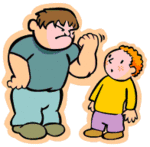Cyberbullying
- This article is satire. To see what we on Uncyclopedia really think about cyberbullying, please go to Beginner's Guide/Cyberbullying without passing GO.
Bullying has existed for as long as humans have been in close proximity to one other. Pushing, shoving, teasing, insulting and maiming people with inferior evolutionary traits has been a time-honored tradition for thousands of years, yet the act of bullying has changed significantly throughout history. With the advent of oral language, bullies could deliver biting verbal attacks at their victims instead of just actually biting them, and the introduction of statewide education has led to even more innovations in bullying as emotionally stunted young ones cope with the harsh realities of life through a fist to the gut. While other areas of society changed dramatically with the coming of the internet, so too has bullying. Social networks, chatrooms, forums, and other places online where people (poorly) attempt communication have revolutionized how people bully others; no longer are hooligans limited to physical interaction to emotionally traumatize. In recent years, this revolution in coercion has led to the birth of the term new, Cyberbullying.
Why Cyberbully?[edit]
The appeal of cyberbullying isn't hard to see, as it has almost all the perks of normal bullying without the risk of getting caught or facing consequences. If you don't see the appeal of normal bullying, you are much too sheltered and naive to be using the internet. What has made the internet great for mischief and mayhem has also made cyberbullying an incredibly attractive hobby, like skiing but with depression-induced suicide.
- Anonymity. The most evident and one of the most important reasons to cyberbully is the anonymity. Although no one is truly anonymous on the internet, it's much easier to hide behind seven proxies online than in the real world.
- It's fun for everyone, including you. and you cant get sued and no one gets mad.
- It's safe for everyone, including you. No scratches or bitemarks, and no frivolous lawsuits.
- Never has there been a more concentrated population of geeks, nerds, and other bully bait than on the internet.
- Broken bones and bruises will heal with time. A brutal attack on ones self esteem causes much more permanent damage, and will cause your own self esteem to skyrocket.
- It's cool, like smoking. People think you're tough when they see your screen name next to a childish insult or threatsssssss. [[
- Multi Tasking. Watch porn while destroying the mental stability of any number of victims at the same time.
- Bully foreigners. Other countries are just teeming with prey (especially America!)
- Piss off Uncyclopedia. No matter what its stance is, it's still a machine.
- Improve the Wikis, Blogs, and other webpages with your witty remarks such as, "You suck," and, "Your Gay."
- Kill time while all alone at home.
- Sexy appeal. Girls will love guys who can type trash and eat it.
Cyberbullying, A good idea, but does it go far enough?[edit]
Usually Cyberbullying is a relatively satisfying experience for all, but sometimes the appropriate reaction isn't provoked from the victim. This is probably because he or she is exactly what you said, "a homo." Usually this person has responded to your bullying with a witty defence, or has not responded at all. Whatever you do, do not try to bully someone who has good wit, because these people are usually just gaytards who might be contagious. If the victim doesn't reply to your message, it's probably because that person is "pretending" to have a life. Phh, yeah right, what a douchebag.
But How Can It Be Rewarding If You Can't See Their Expression?[edit]
Of course we all love to see the reaction of the torturee, but isn't it all that much better if you guess? Real life is usually disappointing compared to the wonderful notions in the human mind.
Cyberbullying on Uncyclopedia[edit]
Uncyclopedia's policy manual puts cyberbullying in especially high esteem, second only behind writing anything else, and to taking cyberbullying to any other website. Uncyclopedia's vintage works of cyberbullying are listed for the reader's amusement on a page called QVFD. Avoid the last-minute rush.


